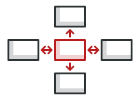
Mediator in Go
Mediator is a behavioral design pattern that reduces coupling between components of a program by making them communicate indirectly, through a special mediator object.
The Mediator makes it easy to modify, extend and reuse individual components because they’re no longer dependent on the dozens of other classes.
Conceptual Example
An excellent example of the Mediator pattern is a railway station traffic system. Two trains never communicate between themselves for the availability of the platform. The stationManager acts as a mediator and makes the platform available to only one of the arriving trains while keeping the rest in a queue. A departing train notifies the stations, which lets the next train in the queue to arrive.
train.go: Component
package main
type Train interface {
arrive()
depart()
permitArrival()
}
passengerTrain.go: Concrete component
package main
import "fmt"
type PassengerTrain struct {
mediator Mediator
}
func (g *PassengerTrain) arrive() {
if !g.mediator.canArrive(g) {
fmt.Println("PassengerTrain: Arrival blocked, waiting")
return
}
fmt.Println("PassengerTrain: Arrived")
}
func (g *PassengerTrain) depart() {
fmt.Println("PassengerTrain: Leaving")
g.mediator.notifyAboutDeparture()
}
func (g *PassengerTrain) permitArrival() {
fmt.Println("PassengerTrain: Arrival permitted, arriving")
g.arrive()
}
freightTrain.go: Concrete component
package main
import "fmt"
type FreightTrain struct {
mediator Mediator
}
func (g *FreightTrain) arrive() {
if !g.mediator.canArrive(g) {
fmt.Println("FreightTrain: Arrival blocked, waiting")
return
}
fmt.Println("FreightTrain: Arrived")
}
func (g *FreightTrain) depart() {
fmt.Println("FreightTrain: Leaving")
g.mediator.notifyAboutDeparture()
}
func (g *FreightTrain) permitArrival() {
fmt.Println("FreightTrain: Arrival permitted")
g.arrive()
}
mediator.go: Mediator interface
package main
type Mediator interface {
canArrive(Train) bool
notifyAboutDeparture()
}
stationManager.go: Concrete mediator
package main
type StationManager struct {
isPlatformFree bool
trainQueue []Train
}
func newStationManger() *StationManager {
return &StationManager{
isPlatformFree: true,
}
}
func (s *StationManager) canArrive(t Train) bool {
if s.isPlatformFree {
s.isPlatformFree = false
return true
}
s.trainQueue = append(s.trainQueue, t)
return false
}
func (s *StationManager) notifyAboutDeparture() {
if !s.isPlatformFree {
s.isPlatformFree = true
}
if len(s.trainQueue) > 0 {
firstTrainInQueue := s.trainQueue[0]
s.trainQueue = s.trainQueue[1:]
firstTrainInQueue.permitArrival()
}
}
main.go: Client code
package main
func main() {
stationManager := newStationManger()
passengerTrain := &PassengerTrain{
mediator: stationManager,
}
freightTrain := &FreightTrain{
mediator: stationManager,
}
passengerTrain.arrive()
freightTrain.arrive()
passengerTrain.depart()
}
output.txt: Execution result
PassengerTrain: Arrived
FreightTrain: Arrival blocked, waiting
PassengerTrain: Leaving
FreightTrain: Arrival permitted
FreightTrain: Arrived
 LAST DAYS OF THE WINTER SALE!
LAST DAYS OF THE WINTER SALE!
